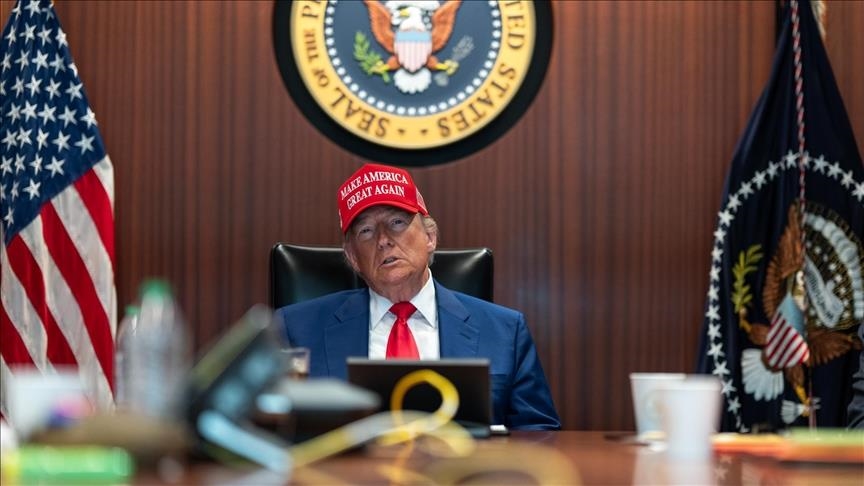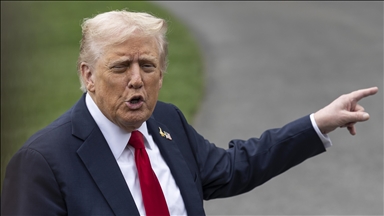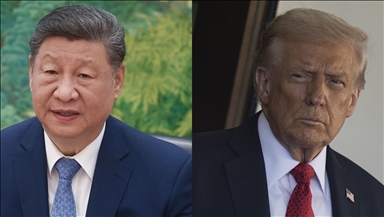EXPLAINER – Why Trump’s MAGA movement is increasingly divided over Israel
Six months into his second term, Trump is facing growing backlash from MAGA conservatives over continued US involvement in Israeli wars

- Figures like Tucker Carlson and Marjorie Taylor Greene have condemned US strikes on Iran as contrary to 'America First' ideals
- Trump has defended the alliance but publicly distanced himself from parts of his base, deepening the rift
WASHINGTON
Six months into US President Donald Trump's second term, a rift is growing between his administration and some of his once-most ardent supporters — the MAGA, or Make America Great Again, movement.
At the center of the controversy lies the US’ unwavering support for Israel — with some of Trump’s loyalists questioning whether the country's current trajectory aligns with his “America First” foreign policy agenda.
Some MAGA conservatives continue to defend the US-Israel “special relationship.” But younger Republicans and key figures, like Tucker Carlson, Steve Bannon, and Marjorie Taylor Greene, are increasingly skeptical of American involvement in Israeli wars.
Why is MAGA divided over Israel?
Recent tensions have mainly focused on growing MAGA skepticism toward US military support for Israel, especially after Trump backed Israeli strikes on Iran.
But the dissent intensified when Trump slammed his supporters earlier this week for what he called the “Jeffrey Epstein Hoax,” accusing them of falling for a left-wing “smear” campaign. “Let these weaklings continue forward and do the Democrats work,” he wrote on Truth Social, “I don’t want their support anymore.”
Conservative commentator and former FOX News host Tucker Carlson questioned whether Epstein had ties to Israeli intelligence, during a Turning Point USA summit last week.
“Were you working on behalf of the Mossad? Were you running a blackmail operation on behalf of a foreign government?” Carlson asked.
MAGA anger is not solely about Israel. Many in the movement that the president popularized during his presidential campaigns in 2016 and 2024, also believe Epstein was murdered and accuse the US of covering up his demise, as well as his actions during his lifetime.
Where do tensions stem from?
Following Israeli strikes on Iran last month, Carlson wrote in a newsletter: “Drop Israel. Let them fight their own wars.”
The US joined the Israeli war with Iran on June 22, striking three Iranian nuclear sites.
Rep. Marjorie Taylor Greene, a close Trump ally in Congress, echoed Carlson’s message in an interview last month with Steve Bannon, a former Trump White House aide who also opposes US military intervention in Iran.
“MAGA is not for foreign wars. We are not for regime change, and we are for America first … We bombed Iran on behalf of Israel. Yes, it was on behalf of Israel,” she said.
Even in Congress, where support for Israel has long been bipartisan, some MAGA-aligned lawmakers are pushing back.
Greene criticized proposed legislation in May that would penalize Americans participating in boycotts of Israel, arguing that “it is my job to defend Americans’ rights to buy or boycott whomever they choose.”
Greene also joined progressive Democrats Rashida Tlaib and Ilhan Omar on Thursday in voting to strip $500 million in US missile funding to Israel — an effort overwhelmingly rejected by the House in a 422-6 vote.
Yet some in Trump’s orbit remain committed to a robust US-Israel alliance. Conservative radio host Mark Levin blasted isolationist critics on social media last month, saying, “The isolationists are more Bernie Sanders and Noam Chomsky. I remind them that Iran is the enemy, not common sense MAGA conservatives.”
What has Trump said or done?
Trump has largely upheld his pro-Israel stance in his second term, as in his first, lifting Biden-era holds on 2,000-pound bomb shipments, reversing sanctions on illegal Israeli settlers, appointing pro-Israel figures to key roles and revoking visas of pro-Palestinian students.
Since starting his second term in January, Trump has hosted Israeli Prime Minister Netanyahu at the White House three times.
Though he backed Israeli strikes on Iran after initial hesitation, his administration has pursued a ceasefire and hostage deal in the Gaza Strip as promised during his presidential campaign.
He did not hesitate to voice opposition when he disagreed with Israel. Following Israeli strikes on Syria this week, State Department spokesperson Tammy Bruce told reporters Thursday that “the United States did not support recent Israeli strikes on Syria” and urged “real de-escalation and peace.”
Trump also called Netanyahu to express concern Thursday after an Israeli strike hit Gaza’s only Catholic church, killing three people. “It was not a positive reaction,” the White House said about the president’s response to the strikes. He called Prime Minister Netanyahu this morning to address the strikes on that church in Gaza … It was a mistake by the Israelis to hit that Catholic Church. That's what the prime minister relayed to the president.”
Similarly, the killing of Palestinian-American Sayfollah Musallet, 20, who was beaten to death by illegal Israeli settlers in the occupied West Bank last week, drew a sharp response from US Ambassador to Israel Mike Huckabee. “There must be accountability for this criminal and terrorist act,” Huckabee said, demanding Israel investigate.
One day later, however, Huckabee made a surprise appearance at a Tel Aviv district court to attend Netanyahu’s corruption trial.
Is there a broader shift in conservative views on Israel?
Public opinion in the US is also showing signs of change. A recent Quinnipiac University poll on June 11 found that Republican support for Israel has dropped 14 points in the last year, from 78% in May 2024 to 64% now, while Democratic sympathy has fallen even more sharply, from 30% to just 12%.
A separate survey by the Chicago Council on Global Affairs, released in May, found that Americans now rate Israel at 50 on a 0–100 favorability scale — the lowest recorded since the poll began in 1978. The same study showed 61% of Americans view Israel’s overall role in the region negatively, and 58% said the US should take neither side in the Israeli-Palestinian conflict.
In March, The Heritage Foundation conservative think tank published a report that urged the US to “re-orient its relationship with Israel” from a special alliance to an “equal strategic partnership” during the next two decades.
Anadolu Agency website contains only a portion of the news stories offered to subscribers in the AA News Broadcasting System (HAS), and in summarized form. Please contact us for subscription options.







